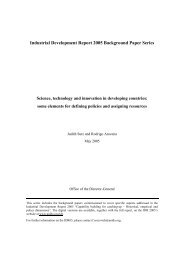Manual on the Development of Cleaner Production Policies ... - Unido
Manual on the Development of Cleaner Production Policies ... - Unido
Manual on the Development of Cleaner Production Policies ... - Unido
Create successful ePaper yourself
Turn your PDF publications into a flip-book with our unique Google optimized e-Paper software.
DEVELOPMENT OF CP POLICY<br />
MODULE 2: BASICS OF CP POLICY<br />
SLIDE: Typical policies <strong>of</strong> relevance to CP<br />
• Industrial development policy;<br />
• Envir<strong>on</strong>mental policy;<br />
• Foreign trade policy/customs policy;<br />
• Investment promoti<strong>on</strong> policy;<br />
• Fiscal policy and tax regimes;<br />
• Energy and transport policy;<br />
• Agricultural policy;<br />
• Educati<strong>on</strong> and science and technology policy;<br />
• Health policy.<br />
This slide is a useful dem<strong>on</strong>strati<strong>on</strong> <strong>of</strong> <strong>the</strong> range <strong>of</strong> sectoral and cross-sectoral<br />
policies that are relevant to <strong>the</strong> mainstreaming <strong>of</strong> CP and policy integrati<strong>on</strong>.<br />
You may wish to adapt this slide to present <strong>the</strong> policies in effect in your own<br />
country.<br />
Background<br />
Governments tend to focus <strong>on</strong> ec<strong>on</strong>omic growth and more <strong>of</strong>ten than not fail to c<strong>on</strong>sider CP and<br />
polluti<strong>on</strong> preventi<strong>on</strong> as a matter <strong>of</strong> nati<strong>on</strong>al policy. On <strong>the</strong> o<strong>the</strong>r hand, protecti<strong>on</strong> <strong>of</strong> <strong>the</strong> envir<strong>on</strong>ment<br />
and public health, stimulating industrial growth and trade and investment promoti<strong>on</strong> are seen as policy<br />
issues with corresp<strong>on</strong>ding policy agendas. <strong>Cleaner</strong> producti<strong>on</strong> is perceived not as a policy issue, but<br />
ra<strong>the</strong>r as a technical soluti<strong>on</strong>. C<strong>on</strong>sequently, CP c<strong>on</strong>cepts have not as a rule been mainstreamed in<br />
public policies related to ec<strong>on</strong>omic activity, even though <strong>the</strong>re is a wide range <strong>of</strong> policies where CP<br />
could be successfully applied.<br />
As far as mainstreaming CP is c<strong>on</strong>cerned, sectoral and industrial policies could emphasize full cost<br />
pricing for energy and materials use, as well as for <strong>the</strong> manufacture, use and disposal <strong>of</strong> all products.<br />
Trade and industry policies should seek to achieve <strong>the</strong> efficient use <strong>of</strong> energy and materials for all<br />
materials processing activities (internati<strong>on</strong>al best practice). Lastly, industrial policies should include<br />
envir<strong>on</strong>mental c<strong>on</strong>siderati<strong>on</strong>s. This integrati<strong>on</strong> can be achieved—or at least promoted—by fostering<br />
collaborati<strong>on</strong> between envir<strong>on</strong>mental agencies, investment promoti<strong>on</strong> agencies, <strong>the</strong> science and<br />
technology community and commercial banks.<br />
SLIDE: Inserti<strong>on</strong> points for CP in sectoral policies<br />
• Improving efficiency and competitiveness;<br />
• Ec<strong>on</strong>omic development and investment promoti<strong>on</strong>;<br />
• Industrial development strategy;<br />
• Tax and customs systems;<br />
• Financing mechanisms and support schemes.<br />
PAGE 39
















